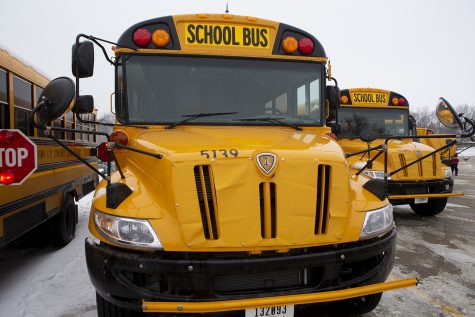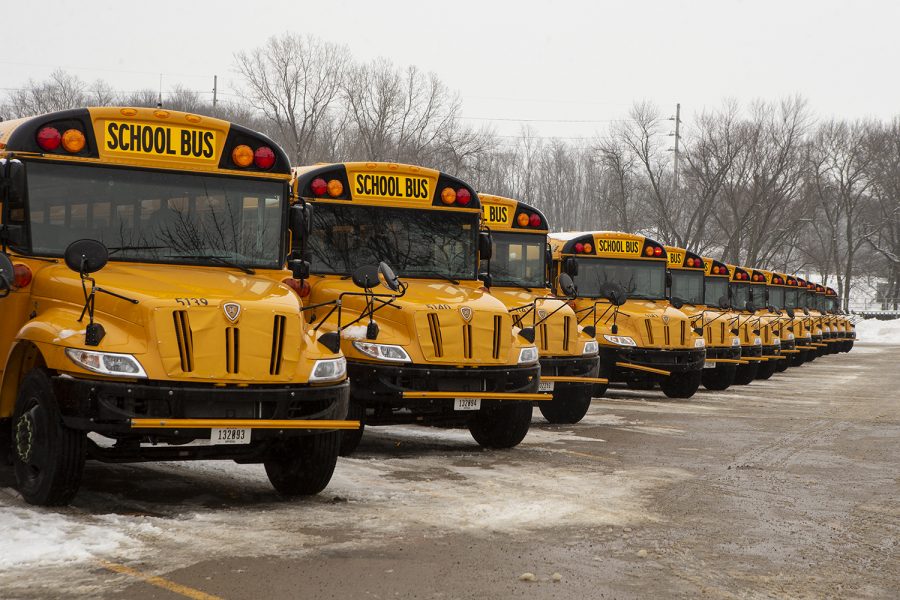Iowa City School Board to replace school buses with electric cars
Leaders within the Iowa City Community School District plan to convert diesel school buses into electric vehicles as soon as in the next 11 years.
January 27, 2020
In an ongoing effort to reduce any negative impact on the environment in the area, the Iowa City Community School District has announced that wheels are in motion to replace its school buses with electric vehicles.
The district has worked with a team at the University of Northern Iowa to conduct a greenhouse-gas emissions inventory and develop a climate action plan for the schools, Community Relations Director Kristin Pedersen wrote in an email to The Daily Iowan.
Among other suggestions, the resultant plan recommended that the district convert its school buses to electric vehicles in the next 11 years.
“Our district is committed to reducing our impact of greenhouse gas emissions on the environment and will continue to evaluate the recommendations from the UNI team,” Pedersen said.
The idea was initially presented at a school board work session in December 2019 by Eric Giddens, energy education and outreach coordinator at UNI and a member of the International Council for Local Environmental Initiatives. The only way to eliminate emissions entirely, Giddens said, is to convert to electric buses and rely on green electricity.
RELATED: IC School District proposes sustainability resolution
From his estimates, Giddens said that a single electric bus would cost the district $230,000 up front, compared with the $110,000 price tag for a diesel bus.
While the initial cost of an electric bus is more than double that of its diesel counterpart, Giddens said research shows the large investment will have a beneficial long-term pay off, saving the district more money and energy overall.

Superintendent Stephen Murley acknowledged the increase in cost, and said the district will conduct a “full exploration process” before returning to the school board with a projected budget and timeline for the project.
Although the district will have to expand its budget for electric vehicles, Murley said, there is money set aside in the district’s life-cycle fund for purchasing new vehicles. The physical, plant, and equipment levy, which board members and district voters have passed to allocate toward a variety of areas, will cover the rest of the costs, he said.
No other districts have implemented electric bus fleets to Giddens’ or Murley’s knowledge, the pair said.
RELATED: City Council declares a state of climate crisis
“I don’t know of any anywhere else [that’s taken this kind of initiative]. That’s why we should be celebrating this,” Giddens said. “This is something truly cutting edge and innovative that the Iowa City School District is doing. There aren’t any school districts in the state of Iowa that are exploring emissions reduction like Iowa City School District is.”
After the team at UNI took note of the district’s greenhouse-gas emissions, it found that school buses serve as one of two significant sources of emissions in the district.
According to data from UNI’s research, the district bus fleet makes up around 8 percent of the district’s greenhouse-gas emissions, while operating school and other district buildings account for an approximate 90 percent.
Reducing the impact of building operations is a working goal for the district. Murley said leaders within the district are already in the process of converting to geothermal energy, and have also switched to more energy efficient windows, roofs, and light bulbs.
“This is an enormous opportunity for us, through that education process, to influence our students to help them better understand their role in the greater world and their social responsibility,” Murley said. “And you can’t just sit in a classroom and tell people to do that, you really need to be actively involved in getting it done.”






